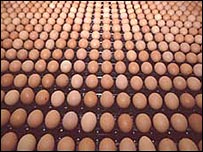The ACT – that’s the Australian Capital Territory, similar to Washington, D.C. –recorded its highest ever number of salmonella cases in 2012, with a report revealing there were eight outbreaks between 2011 and 2012.
 The ACT Chief Health Officer’s report, released on Friday, reveals there were 233 cases reported in 2012, a 47 per cent increase on the number of cases in 2011. The report is based on data collected between July 2010 and June 2012.
The ACT Chief Health Officer’s report, released on Friday, reveals there were 233 cases reported in 2012, a 47 per cent increase on the number of cases in 2011. The report is based on data collected between July 2010 and June 2012.
There were eight outbreaks of foodborne salmonellosis in the ACT during 2011 and 2012. More than 125 people fell ill and 17 were hospitalised.
Eggs were identified as the “probably food vehicle” in five of the outbreaks.
Salmonellosis, an infection caused by the bacterium Salmonella, can cause patients to become seriously ill with symptoms including abdominal pain, diarrhea, fever, nausea and vomiting. In serious cases the bacteria enter the blood stream and can cause pneumonia, septic arthritis and meningitis.
The report indicated there was a higher than expected number of cases, especially between January to May 2012 and a spike in December 2012.
“Increases in notifications are not unexpected at these times, reflecting both the seasonality associated with salmonellosis in Australia and its potential as an outbreak agent,” the report said.
Acting Chief Health Officer Andrew Pengilley said salmonella cases had generally increased around Australia.
“Most salmonella cases are not related to outbreaks and are individual, where people don’t have a clear idea where they might have contracted the bacteria,” he said.
“It can reflect food preparation at home or food transport issues such as food getting warm before it’s eaten. It’s important that people be aware of those risks in their own kitchen because that’s certainly another place you can get salmonella.”
The report also revealed there were 16 food-poisoning outbreaks between July 2010 and June 2012. Two were caused by food eaten at private residences, one each from a catered event and a festival, while the rest were traced to registered food businesses.
Maybe it’s the ridiculous desire of Australian food joints to use raw eggs. That kind of clear speaking ain’t going to come from Dr. Bureaucrat, and more people will get sick.
The figures in the report do not include salmonella cases for last year when Canberra had its biggest salmonella outbreak. About 140 diners fell ill and 15 were admitted to hospital after eating home-made mayonnaise – made using raw eggs later found to contain salmonella – at Copa Brazilian Churrasco restaurant in May last year.
A table of raw egg related outbreaks in Australia is available at https://barfblog.com/wp-content/uploads/2014/03/raw-egg-related-outbreaks-australia-3-3-14.xlsx.
